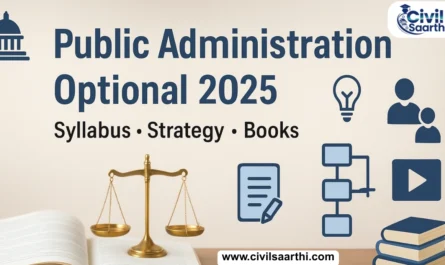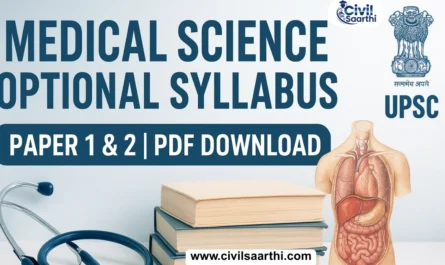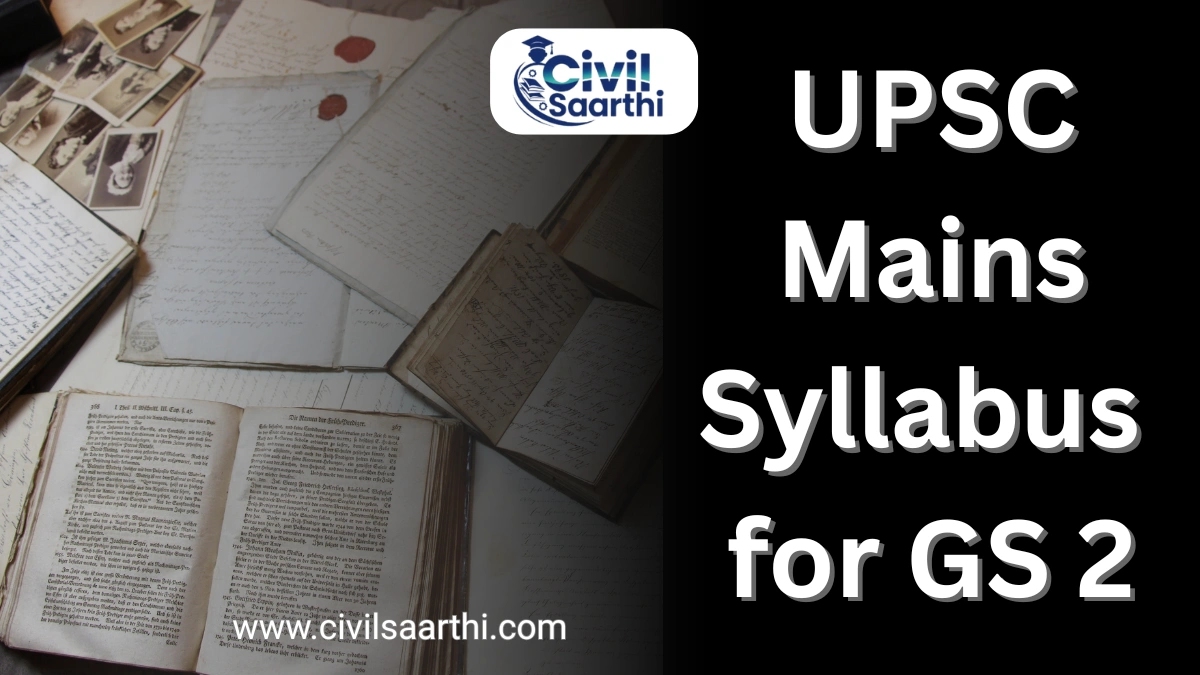The Union Public Service Commission (UPSC) exam is one of the toughest and most prestigious exams in India. Every year, thousands of aspirants prepare to get selected for top government services like IAS, IPS, IFS, and others. It’s important to understand the UPSC Exam Pattern 2026 clearly for clearing the exam. This article breaks down the exam stages, subjects and marks distribution.
UPSC Exam Pattern 2026
The UPSC Civil Services Examination (CSE) 2026 is a highly competitive exam conducted by the Union Public Service Commission to recruit candidates for Grade A and Grade B government positions like IAS, IPS, and IFS. The UPSC Exam Pattern 2026 consists of three stages: Preliminary, Mains, and Interview designed to test a candidate’s knowledge, analytical ability, writing skills and personality traits essential for a career in civil services.
UPSC Exam Pattern 2026 Overview
The key highlights of the UPSC Exam Pattern 2026 have been discussed below in the table for UPSC Aspirants preparing for the civil services examination.
UPSC Exam Stages 2026 Overview | ||
| Stage | Description | Purpose |
| 1. Preliminary Exam | Objective type test (MCQs) | To shortlist candidates for Mains |
| 2. Mains Exam | Written descriptive exam | To test in-depth knowledge and analytical skills |
| 3. Interview (Personality Test) | Face-to-face interview | To assess personality, communication, and suitability |
UPSC Selection Process 2026
The UPSC Selection Process 2026 comprises of three stages to assess a candidate’s knowledge, skills, and personality:
- Preliminary Exam (Prelims)
- Objective-type with multiple-choice questions
- Tests general awareness, aptitude, and current affairs
- Serves as a screening test (marks not counted in final selection)
- Mains Exam
- Descriptive written papers
- Assesses in-depth knowledge, analytical and writing skills
- Marks are crucial for final selection
- Interview (Personality Test)
- Face-to-face assessment by a panel
- Evaluates communication, confidence, decision-making, and suitability for civil services.
UPSC Exam Pattern 2026 – Prelims
The UPSC Prelims Exam Pattern 2026 is designed to filter candidates for the next round. It consists of two objective papers. The table below gives the details of UPSC Exam Pattern 2026 – Prelims for each paper including subjects, marks, and duration.
UPSC Exam Pattern 2026 – Prelims | |||||
| Paper | Subjects | Number of Questions | Marks | Duration | Qualifying Marks |
| General Studies Paper I | History, Geography, Polity, Economy, Environment, Science, Current Affairs | 100 | 200 | 2 hrs | No fixed cutoff; varies every year |
| General Studies Paper II (CSAT) | Logical reasoning, Comprehension, Basic numeracy | 80 | 200 | 2 hrs | 33% minimum (66.67 marks) required |
Also Read: UPSC Prelims Syllabus 2026
UPSC Exam Pattern 2026 – Mains
The UPSC Exam Pattern 2026 – Mains exam tests candidates in-depth across several subjects. It consists of 9 papers in total, with 7 counting towards the final merit. The table below gives a detailed breakdown of these papers.
UPSC Exam Pattern 2026 – Mains | |||||
| Paper No. | Paper Name | Type | Marks | Time Duration | Qualifying/Counted for Merit |
| 1 | Essay | Descriptive | 250 | 3 hours | Counted |
| 2 | General Studies Paper I (GS I) – Indian Heritage, History, Geography | Descriptive | 250 | 3 hours | Counted |
| 3 | General Studies Paper II (GS II) – Governance, Constitution, Polity, Social Justice | Descriptive | 250 | 3 hours | Counted |
| 4 | General Studies Paper III (GS III) – Technology, Environment, Security, Economy | Descriptive | 250 | 3 hours | Counted |
| 5 | General Studies Paper IV (GS IV) – Ethics, Integrity, and Aptitude | Descriptive | 250 | 3 hours | Counted |
| 6 | Optional Subject Paper 1 | Descriptive | 250 | 3 hours | Counted |
| 7 | Optional Subject Paper 2 | Descriptive | 250 | 3 hours | Counted |
| 8 | Language Paper A (Indian language) | Qualifying | 300 | 3 hours | Qualifying |
| 9 | Language Paper B (English) | Qualifying | 300 | 3 hours | Qualifying |
Also Read: UPSC Mains Syllabus
UPSC Exam Pattern 2026 – Interview
After clearing the Mains, candidates face the UPSC Exam Pattern 2026 – Interview stage, which evaluates their personality and communication skills. The table below summarizes key details about the Interview process.
UPSC Exam Pattern 2026 – Interview | |
| Parameter | Description |
| Maximum Marks | 275 |
| Duration | Around 30-45 minutes |
| Purpose | Assess personality, communication skills, decision-making, and overall suitability for civil services |
| Marks Consideration | Added to Mains marks for final ranking |
| Panel | The interview is conducted by a panel of experts, including experienced bureaucrats, academicians, and subject-matter specialists. |
| Venue | The interviews are usually conducted at the UPSC office in New Delhi. |
UPSC Exam Pattern 2026 Summary
To make it easy to remember, here is a summarized table showing the entire UPSC Exam Pattern 2026, including all stages and marks.
UPSC Exam Pattern 2026 Summary | ||||
| Stage | Number of Papers | Total Marks | Type | Purpose |
| Prelims | 2 | 400 | Objective (MCQs) | Qualifying for Mains |
| Mains | 9 (7 counted for merit) | 1750 (for merit) + 600 (qualifying) | Descriptive (Essay & Papers) | Final selection written test |
| Interview | 1 | 275 | Oral | Personality test for final ranking |
UPSC Exam 2026 Negative Marking
Understanding UPSC Exam 2026 Negative Marking is essential to avoid losing unnecessary marks during the exam. Below is a clear explanation of the penalty system in both the Prelims and Mains stages of the UPSC examination.
Negative Marking in UPSC Prelims 2026
The Prelims stage includes negative marking for every incorrect answer, which makes accuracy just as important as knowledge. This rule is applied to both Paper I and Paper II (CSAT).
Negative Marking in UPSC Prelims 2026 | |
| Paper | Negative Marking Rule |
| Paper I (GS) | 1/3rd of marks per wrong answer (– 0.66 marks approx.) |
| Paper II (CSAT) | 1/3rd of marks per wrong answer (– 0.83 marks approx.) |
- No negative marking for unanswered questions.
- To avoid penalties, skip questions you are unsure about instead of guessing.
Negative Marking in UPSC Mains 2026
While the Mains exam does not have any negative marking, it still demands well-structured and relevant answers to score well. Marks are awarded based on content quality, coherence, and clarity.
- There is NO negative marking in the UPSC Mains examination.
- All questions are descriptive in nature.
- Poor structure, irrelevant points, or unclear writing can still result in low marks.
UPSC Exam Pattern 2026 FAQs
Is there negative marking in the UPSC exam?
Yes, but only in the Prelims stage. There is no negative marking in Mains or Interview.
Are Prelims marks counted in the final selection?
No. Prelims are only qualifying in nature. Final selection is based on Mains + Interview scores.
How many total papers are there in UPSC?
There are 2 in Prelims, 9 in Mains, and 1 Interview, totaling 12 components.
What is the qualifying mark for CSAT?
You must score at least 33% (66 marks out of 200) to qualify.
Can I choose any language for the Mains exam?
The qualifying language paper (Paper A) must be an Indian language from the 8th Schedule. English is compulsory for Paper B.







